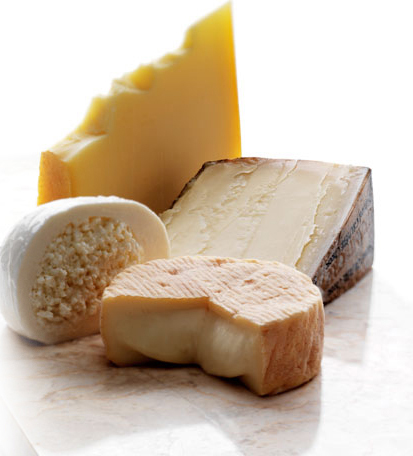To eat it or not to eat it: a matter of taste
 Cheese rinds are an interesting topic. Many people are under the impression that there is a specific etiquette to eating the cheese rind, but that just isn’t true. The question of whether to eat the rind of a cheese is, in most cases, strictly up to the consumer of the cheese.
Cheese rinds are an interesting topic. Many people are under the impression that there is a specific etiquette to eating the cheese rind, but that just isn’t true. The question of whether to eat the rind of a cheese is, in most cases, strictly up to the consumer of the cheese.
There are exceptions. Wax rinds are of course not meant to be eaten, although I’ve met someone who claims to have been eating cheese wax his entire life (I don’t recommend this practice.). Leaves or bark that are often soaked in something wondrous and tied around cheeses as they age, should also not be eaten.
Fresh cheeses and most blue cheeses do not have much of a rind compared to larger and longer aged cheeses. Many goat cheeses are coated in ash before they go through a quick aging process. This ash is meant to be eaten but I’ve seen people shy away from the dark layer. It really is a matter of taste, the ash flavor tones down the more sharp edges of a fresh chevre and this flavor combination has been used for hundreds of years.
The larger and more mature cheeses gain flavor and pungency during the aging process. The rind takes on the characteristic flavors from the cave in which it’s aged and the various bacteria who are working their magic on the curds. These tough rinds are the ones which create controversy. These rind can be musty, chewy, and in general is more stinky than the inner creamy paste of the cheese. And if the cheese has a “washed rind” – watch out because that can mean an ultra-pungent ammonia infused rind experience. For some people the taste of the cave or stinkiness of a washed rind is not appealing. But for others the rind adds a depth of flavor to the whole cheese tasting experience. Again, it’s a matter of taste.
The beauty of cheese is its amazing diversity and it should be enjoyed just as diversely. Accept no rules concerning cheese rinds. Be bold and adventurous with your cheese experiences. Try a little rind now and then.
Article written by contributing editor Vickie McCorkendale


 Lybations
Lybations